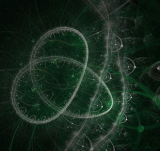swanread
as I understand it, the central tenet of quantum physics is-
that an electron moves from a to b without passing through any of the space in between, and faster than the speed of light
the only reason this is accepted, is that no alternative explanation exists within newtonian physics for the activity of electrons - but is this the case? alternatives please, or 'proofs' that this is so.
my quarrel with the tenet is this:
just because the electron 'appears' to move through space, does not mean that it does move.
I suggest that electrons stay put, and that they obtain their visible mass entirely from energy. When they are switched on, they are measurable; when switched off they seem to disappear from that particular point in space.
electrons switch on and off according to the number needed to maintain the identity of the neighbouring nuclei
this means a gigantic number of extra electrons beyond those that can be measured - this would account for dark matter
this theory would fit with newtonian physics - thus dispensing with quantum theory!
that an electron moves from a to b without passing through any of the space in between, and faster than the speed of light
the only reason this is accepted, is that no alternative explanation exists within newtonian physics for the activity of electrons - but is this the case? alternatives please, or 'proofs' that this is so.
my quarrel with the tenet is this:
just because the electron 'appears' to move through space, does not mean that it does move.
I suggest that electrons stay put, and that they obtain their visible mass entirely from energy. When they are switched on, they are measurable; when switched off they seem to disappear from that particular point in space.
electrons switch on and off according to the number needed to maintain the identity of the neighbouring nuclei
this means a gigantic number of extra electrons beyond those that can be measured - this would account for dark matter
this theory would fit with newtonian physics - thus dispensing with quantum theory!


